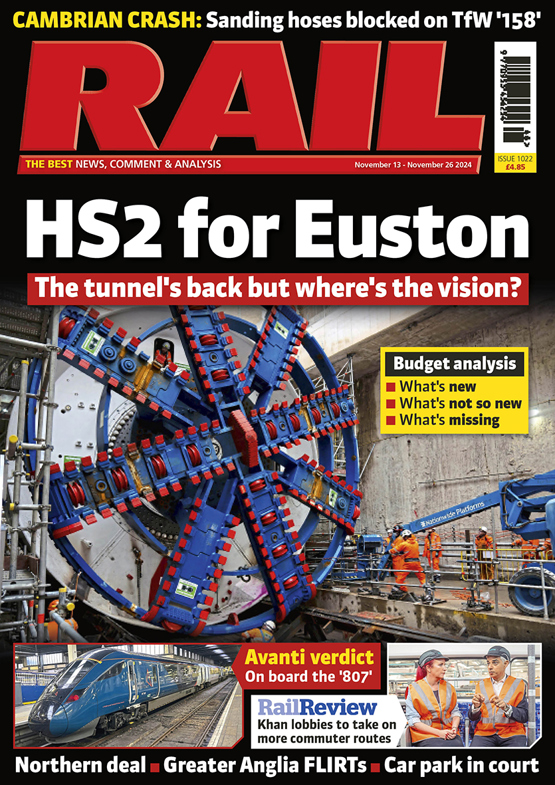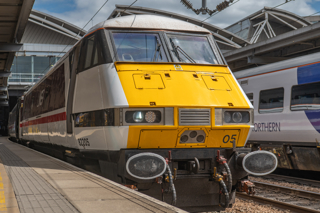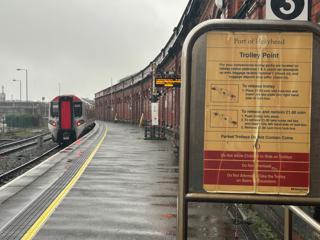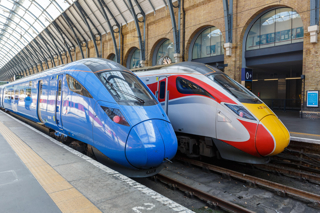A manifesto is supposed to set out the policies for a party vying to form the next government.
In government, it’s the first King’s or Queen’s Speech that then demonstrates the highest priorities for legislation.
A manifesto is supposed to set out the policies for a party vying to form the next government.
In government, it’s the first King’s or Queen’s Speech that then demonstrates the highest priorities for legislation.
But seasoned political commentators say nothing usually reveals the true direction, flavour and fundamental forces driving a new government better than its first Budget. That’s when the realities of limited public money come up hard against its idealistic policy ambitions for the future.
If that’s so, some have labelled this first Budget as disappointing for rail. The manifesto ambitions for rail were ambitious, with references to the Swiss integrated transport system and lofty ideals of using public transport to help drive economic growth. Rail also featured strongly in the King’s Speech, followed by several early bills to restructure and nationalise the railway.
The Budget, by comparison, lacked the ambition of the manifesto and the sense of urgency of the early legislation.
Continuing a habit that Labour started under Tony Blair’s 1990s government, some of what appeared to be new announcements of new investments were in fact just reconfirming projects already planned - or even work already under way.
The measures for rail that were genuinely new were welcomed, although some had hoped for more.
Many of these tied up various loose ends around the network - unfinished business left hanging by the last government.
The top lines had been ‘leaked’ some time before, so some weren’t a surprise.
The Budget statement did at least deliver on those leaks, even if it didn’t always add much in the way of details, timings, or indeed even budget numbers.
The start of tunnelling to bring HS2 into Euston was heavily trailered. But when its big moment came in Chancellor Rachel Reeves’ speech, there was nothing on the size of that investment, the platforms, or the station itself.
Running to Euston, Reeves said, would act as the catalyst for private investment into the station. We’re yet to see exactly what that means, but it does raise the curious prospect of government singing the praises of private involvement on the one hand, in order to secure the investment it needs, while on the other pursuing public ownership of the railway as a matter of principle.
There was good news for city transport services outside London, which apparently took local authorities in some areas by surprise. The Sheffield Supertram will be renewed, along with investment in the West Midlands Metro and plans for a light rail between Leeds and Bradford. See pages 6-9 for what was in and what was out, what was really new, and what we already knew.
Environmental campaigners were disappointed that road fuel duty was frozen, while regulated rail fares next year would be allowed to rise by 4.6%.
That shouldn’t have been a great surprise - Labour had openly supported road users, pre-election. And the government argued that the rail fares cap is a small rise over the RPI (retail price index), after a period of rising subsidy following the fall-off of commuter travel in the wake of the pandemic.
But it’s not a good look. Motorists are continually granted airtime to complain about rising prices at the pumps, while rail commuters suffer in silence from each new year’s fares rise to the next.
We know that the road lobby is a powerful one and drivers are a strong electoral force, but there’s so much at stake. Rail is generally so much greener than road and should be a major contributor to reaching net zero targets.
“The focus must be on growing passenger numbers, not making current passengers pay more,” says Rail Partners Chief Executive Andy Bagnall.
The fuel duty announcement has upset the rail freight sector as well as passengers. It’s the 13th year in a row that such a freeze will subsidise road haulage over more sustainable modes of freight.
Freight industry voices expressed disappointment that the playing field has been made no more level. And freight infrastructure improvements will now have to wait for a spending review in the spring.
In our series tracking the new government’s progress against RAIL’s seven ‘manifesto for rail’ points, Howard Johnston says that pushing HS2 through to Euston signals a political consensus as it restarts work that the previous government put on hold (Analysis, pages 26-27).
There is more cross-party agreement on rail policy than might appear from the rhetoric, he argues, as parties face similar budget and political pressures when they reach government.
Of course, money is tight. But, as it argued for its pay settlement with the train drivers, in some areas you have to spend to save elsewhere - invest to grow.
In his column this issue, Christian Wolmar wonders what has happened to Labour’s vision, and the wider strategy for transport in general and rail in particular.
However, Rail Minister Lord Hendy, in his first public speech since taking office, painted a positive contrast between the Budget and other early Labour work compared with his experience of the previous government when he was at Network Rail. Of course, he would say that. But it’s no doubt true.
Railway Industry Association Chief Executive Darren Caplan told me the Budget was at the higher end of expectations, and that it had a distinctly more positive tone on the role of rail compared with the Chancellor’s ‘black hole’ financial statement soon after taking office. Also true.
There’s still time, so let’s hope for more next time.
You can read our anslysis and comment on the Budget in the latest issue of RAIL that's out this week.

Login to continue reading
Or register with RAIL to keep up-to-date with the latest news, insight and opinion.

















Login to comment
Comments
No comments have been made yet.